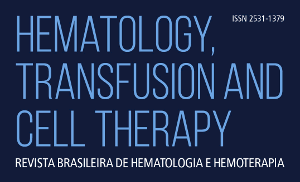In this issue, the Hematology, Transfusion and Cell Therapy Journal is publishing a paper of Alves et al. coordinated by Dr. Payão from the Medical School of Marilia, São Paulo, Brazil, discussing an interesting aspect of cytogenetic abnormalities (CA) in respect to aging. In a retrospective analysis of a large sample (746 patients) over 18 years of observation and including several types of onco-hematological diseases in patients of all ages, the authors investigated the influence of age on the frequency of CA.11 Alves AS, Bataglia FB, Conterno LO, Segato R, Payão SL. Epidemiological and cytogenetic profiles of patients with hematological malignancies and their relationship with aging. Hematol Transfus Cell Ther. 2018;40(3):201-7. The authors found a higher frequency of hematological malignancies among elderly patients, about 51%, followed by adult (38%) and young patients (about of 11%). The authors reported that “it is possible to conclude that failures in genomic mechanisms and hematopoiesis with aging lead to the formation of cells with the chromosomal alterations found in hematological malignancies”. From the 1960s with the description of Philadelphia chromosome in chronic myeloid leukemia (CML),22 Nowell PC. Discovery of the Philadelphia chromosome: a personal perspective. J Clin Invest. 2007;117(8):2033-5. CA have been recognized as important prognostic factors in acute promyelocytic leukemia (APL), acute myeloid leukemia (AML), myelodysplastic syndromes (MDS) and in a great number of onco-hematological diseases and syndromes.33 Arber DA, Orazi A, Hasserjian R, Thiele J, Borowitz MJ, Le Beau MM, et al. The 2016 revision to the World Health Organization classification of myeloid neoplasms and acute leukemia. Blood. 2016;127(20):2391-405. These abnormalities became diagnostic and prognostic markers and they are very useful in the monitoring of minimal residual disease (MDR). Data from the literature supports the higher frequency of onco-hematological diseases in the elderly population.44 Laurie CC, Laurie CA, Rice K, Doheny KF, Zelnick LR, McHugh CP, et al. Detectable clonal mosaicism from birth to old age and its relationship to cancer. Nat Genet. 2012;44(6):642-50. Particularly in AML, elderly patients have a poor prognosis compared to young and adult patients, despite the development of different therapeutic approaches. The authors emphasize that the higher aggressiveness in the elderly is probably due to bone marrow and immune system impairment. Genomic and somatic mutations, inadequate cytokine production, and impairment of modulation and response to stimuli are among the factors associated with age.55 Sahin E, Depinho RA. Linking functional decline of telomeres, mitochondria and stem cells during ageing. Nature. 2010;464(7288):520-8. The paper by Alves et al. presents very interesting data and discussion about the influence and mechanisms associated to frequency, gender, diagnosis and prognosis of onco-hematological diseases and aging.11 Alves AS, Bataglia FB, Conterno LO, Segato R, Payão SL. Epidemiological and cytogenetic profiles of patients with hematological malignancies and their relationship with aging. Hematol Transfus Cell Ther. 2018;40(3):201-7. Moreover, we can see the most frequent CA observed by the authors in a single Brazilian University Laboratory.
-
☆
See paper by Angelica de Souza Batista Maia Alves et al. on pages 201–207.
REFERENCES
-
1Alves AS, Bataglia FB, Conterno LO, Segato R, Payão SL. Epidemiological and cytogenetic profiles of patients with hematological malignancies and their relationship with aging. Hematol Transfus Cell Ther. 2018;40(3):201-7.
-
2Nowell PC. Discovery of the Philadelphia chromosome: a personal perspective. J Clin Invest. 2007;117(8):2033-5.
-
3Arber DA, Orazi A, Hasserjian R, Thiele J, Borowitz MJ, Le Beau MM, et al. The 2016 revision to the World Health Organization classification of myeloid neoplasms and acute leukemia. Blood. 2016;127(20):2391-405.
-
4Laurie CC, Laurie CA, Rice K, Doheny KF, Zelnick LR, McHugh CP, et al. Detectable clonal mosaicism from birth to old age and its relationship to cancer. Nat Genet. 2012;44(6):642-50.
-
5Sahin E, Depinho RA. Linking functional decline of telomeres, mitochondria and stem cells during ageing. Nature. 2010;464(7288):520-8.
Publication Dates
-
Publication in this collection
Jul-Sep 2018

